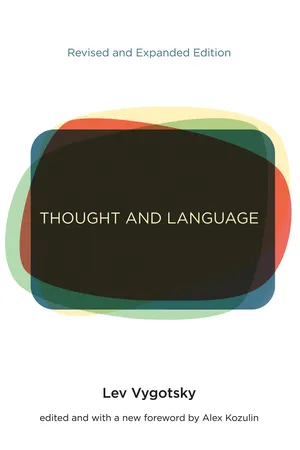
- English
- ePUB (mobile friendly)
- Available on iOS & Android
Thought and Language
About this book
Since it was introduced to the English-speaking world in 1962, Lev Vygotsky's Thought and Language has become recognized as a classic foundational work of cognitive science. Its 1962 English translation must certainly be considered one of the most important and influential books ever published by the MIT Press. In this highly original exploration of human mental development, Vygotsky analyzes the relationship between words and consciousness, arguing that speech is social in its origins and that only as children develop does it become internalized verbal thought.
In 1986, the MIT Press published a new edition of the original translation by Eugenia Hanfmann and Gertrude Vakar, edited by Vygotsky scholar Alex Kozulin, that restored the work's complete text and added materials to help readers better understand Vygotsky's thought. Kozulin also contributed an introductory essay that offered new insight into Vygotsky's life, intellectual milieu, and research methods. This expanded edition offers Vygotsky's text, Kozulin's essay, a subject index, and a new foreword by Kozulin that maps the ever-growing influence of Vygotsky's ideas.
Tools to learn more effectively

Saving Books

Keyword Search

Annotating Text

Listen to it instead
Information
Table of contents
- Cover
- Contents
- Foreword (2012)
- Vygotsky in Context (1986)
- Note on the Title
- Author's Preface
- 1: The Problem and the Approach
- 2: Piaget's Theory of the Child's Speech and Thought
- 3: Stern's Theory of Language Development
- 4: The Genetic Roots of Thought and Speech
- 5: An Experimental Study of the Development of Concepts
- 6: The Development of Scientific Concepts in Childhood: The Design of a Working Hypothesis
- 7: Thought and Word
- Notes
- References
- Index
Frequently asked questions
- Essential is ideal for learners and professionals who enjoy exploring a wide range of subjects. Access the Essential Library with 800,000+ trusted titles and best-sellers across business, personal growth, and the humanities. Includes unlimited reading time and Standard Read Aloud voice.
- Complete: Perfect for advanced learners and researchers needing full, unrestricted access. Unlock 1.4M+ books across hundreds of subjects, including academic and specialized titles. The Complete Plan also includes advanced features like Premium Read Aloud and Research Assistant.
Please note we cannot support devices running on iOS 13 and Android 7 or earlier. Learn more about using the app